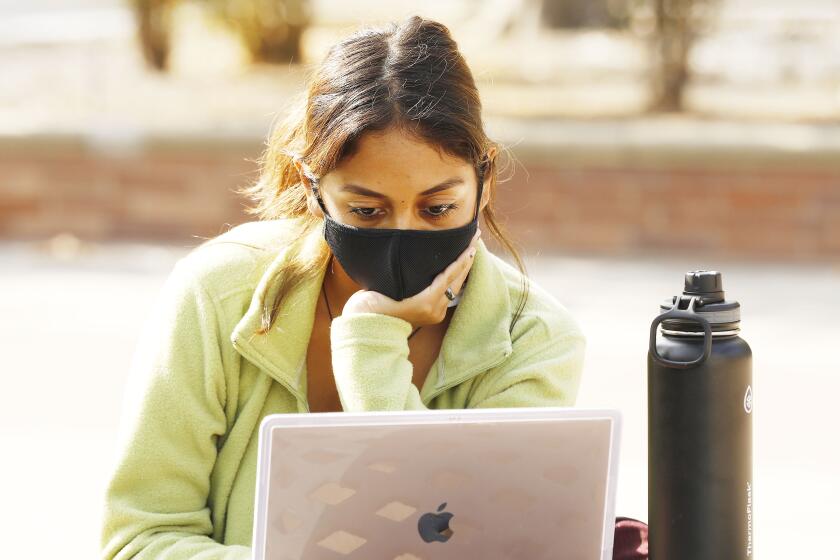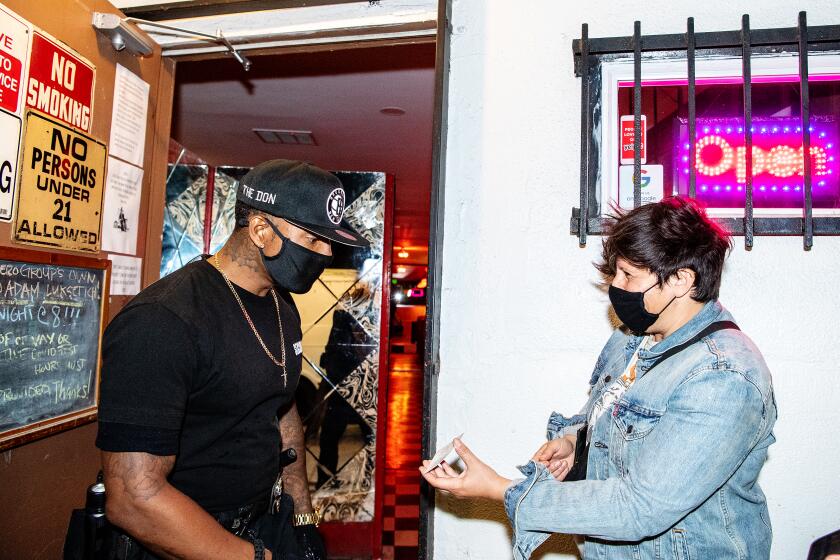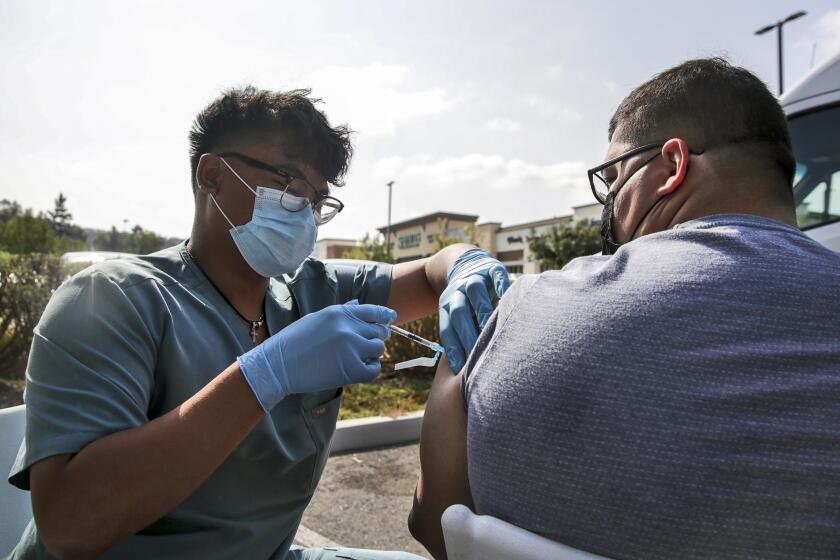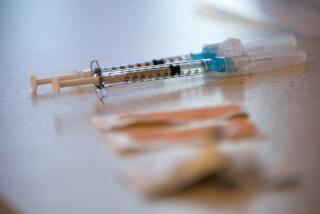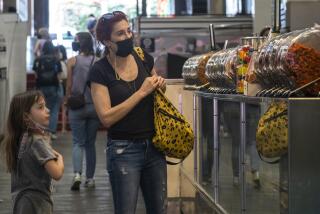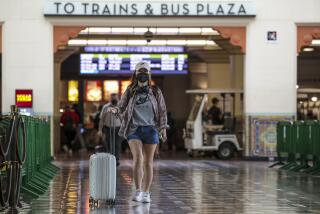L.A. to require proof of COVID vaccination at indoor restaurants, salons, other venues

Customers must present proof of vaccination to enter many indoor businesses in Los Angeles starting Nov. 4 under an ordinance approved by the City Council.
- Share via
The Los Angeles City Council on Wednesday approved a new ordinance that requires proof of vaccination against COVID-19 to enter indoor restaurants, shopping malls, movie theaters, hair and nail salons and many other indoor venues.
The council was scheduled to vote on the law last week but held off when Councilman Joe Buscaino said he would withhold his vote after raising concerns about how the new rules would be enforced.
Buscaino ultimately voted against the ordinance after council members did not agree to several amendments he proposed, including one that would make it a crime to harass or interfere with any employee trying to enforce the rules. He also wanted city analysts to report back on funding sources to help small businesses comply and to ensure police could handle any increased calls tied to the new rules.
No one seconded his motion to amend the law. Councilman Mark Ridley-Thomas said the amendments were significant and deserved more vetting in council committees before council members could make a “thoughtful” decision about them.
The vote on the ordinance was 11-2, with Councilman John Lee joining Buscaino in opposing the law.
Lee said in a statement that he believes the data are clear about the safety and effectiveness of COVID-19 vaccines but that the law “is punitive toward businesses, doesn’t provide an incentive to encourage those who are unvaccinated to get the vaccine, and only furthers the patchwork of regulations that exist across the region.”
COVID-19 hospitalizations have dropped by half from the summer peak, as California continues to steadily shake off the worst of the Delta surge.
Mayor Eric Garcetti signed the ordinance Wednesday, spokesman Harrison Wollman said.
“These new rules will encourage more people to get the shot, and make businesses safer for workers and customers — so that we can save more lives, better protect the vulnerable, and make our communities even safer as we fight this pandemic,” Garcetti said in a statement.
Under the new law, businesses must require proof of vaccination when customers enter indoor facilities, including coffee shops, gyms, museums, bowling alleys, spas and a range of other venues.
The ordinance states that those requirements go into effect on Nov. 4, but because the law did not garner enough votes to pass with “urgency,” it will take a little more than a month from now for the law to officially go into effect, according to the city attorney’s office.
The requirements are set to expire when the city lifts its emergency declaration for the COVID-19 pandemic.
The L.A. rules allow customers to submit written exemptions for religious or medical reasons, but businesses must require those customers to use outdoor facilities, or to show evidence of a recent negative coronavirus test to come inside if no outdoor facilities are available. Customers who have no proof of vaccination or exemption can still enter briefly to use the restroom or pick up a takeout order, according to the ordinance.
Around L.A., some businesses are asking for proof of vaccination against COVID-19 to enter. Here’s what you need to know about vaccination records.
Businesses that violate the rules can face escalating penalties under the ordinance, starting with a warning for a first violation, then a $1,000 fine for a second violation, eventually reaching a $5,000 penalty for a fourth or subsequent violation. The fines would begin to be enforced starting Nov. 29, according to the ordinance.
During Wednesday’s meeting, Councilman Paul Koretz also asked for city analysts to report back on the possibility of requiring businesses that are warned or fined to post the notice prominently for customers to see.
“I know that I would personally take pause when walking into a restaurant that had been warned or cited for violations, so I think this would have an impact,” Koretz said.
The rules will apply to patrons who are eligible to receive a COVID-19 vaccination authorized by the U.S. Food and Drug Administration, including through an emergency use authorization. That would mean that children who are currently too young to be eligible for the shots would not be subject to the requirements to enter businesses.
L.A. is also requiring proof of vaccination to enter indoor city facilities, although unvaccinated people will be provided “alternative arrangements for access to government services,” which could include online or outdoor services or providing a negative test to enter an indoor facility.
Ahead of the vote, business groups raised concerns about possible confusion because Los Angeles County is imposing its own set of vaccination rules for many local businesses and their customers. The county order already applies within L.A. city limits, but California cities can expand on county orders for vaccine requirements.
The county order requires patrons of indoor bars, wineries, nightclubs and lounges to begin showing proof of at least one dose of vaccination starting Thursday, and show proof of full vaccination by Nov. 4. Additionally, starting Thursday, the county order says that participants and workers of outdoor events with 10,000 or more people — such as Dodger Stadium, SoFi Stadium, Universal Studios Hollywood and Six Flags Magic Mountain — provide proof of full vaccination or show that they’ve recently tested negative for the coronavirus.
The city law will also have a stricter requirement for outdoor events than the county’s order. The city will require patrons of outdoor events with 5,000 or more people to show proof of vaccination or a recent negative test.
The Los Angeles County Business Federation argued the city’s new restrictions would put L.A. businesses at “a competitive disadvantage to other neighboring areas” and raised concerns about how businesses would fight false accusations of failing to follow the rules. The United Chambers of Commerce of the San Fernando Valley argued that it would be impractical and unreasonable for businesses to post a bouncer at every entrance to verify vaccination.
Malls have also raised questions about how the rules will be enforced. Last week, Buscaino asked if someone who entered a mall and went through one store — say a Macy’s — to access another store such as Banana Republic would be checked multiple times. A deputy city attorney said that a shopper would not have to show proof of vaccination at Banana Republic “as long as you were checked before entering the mall.”
“So the mall operators are required to have multiple checkpoints at multiple entrances and exits, correct?” Buscaino asked.
“It would be really up to the mall operator to determine how to staff and what works best for them to comply with the ordinance,” deputy city attorney Dania Minassian replied.
Other critics who phoned into the council meeting argued that the rules would infringe on their rights, denouncing them as a divisive and unnecessary form of discrimination against unvaccinated people.
“I look at this as a declaration of war against the people and the businesses of Los Angeles,” one caller said, calling it “a disgusting display of hubris and ego.” He urged people to reach out to the Libertarian Party of Los Angeles County, which has vowed to overturn the rules.
Persistent myths about COVID-19 vaccine safety are hobbling efforts to promote the shots in certain parts of California, officials say.
Others, however, urged the council to pass the new law. Coronavirus cases have fallen, “but not enough to be safe from another wave triggered by winter gatherings or a new variant,” West Adams resident Daniel Kegel wrote. The vaccination rate has been slowly rising, but “we need to move faster. This motion won’t solve the whole problem, but it will reduce the size of future outbreaks, and help the city get back to normal.”
Council members rejected the idea that the rules were overbearing. “Nothing in this ordinance requires you to go and get vaccinated at all,” Councilman Paul Krekorian said last week. But there are certain places where “you will not be allowed to go to put other people at risk.”
“You have rights. You have liberties. But with those rights and liberties come obligations to protect fellow members of your society as well,” Krekorian said, likening the restrictions to not being allowed to smoke in an elevator or on an airplane.
Council President Nury Martinez told reporters last week that at a time when children too young to be eligible for vaccination and medically vulnerable people continue to face the risks of the virus, “this is no longer negotiable. The stakes are too high.”
Coronavirus cases have been waning in Los Angeles County, but the area is still averaging 14 deaths a day from the virus, according to the public health department. More than 61% of L.A. County residents are fully vaccinated against COVID-19, according to data tracked by the Times.
The Los Angeles ordinance is in some ways one of the most sweeping of its kind nationwide, affecting indoor movie theaters, hair and nail salons, malls and museums. But Los Angeles’ law is also weaker than some orders elsewhere because it allows patrons to still enter indoor venues with proof of a negative coronavirus test and a written note by the customer that they have a sincerely held religious belief against the COVID-19 vaccination.
San Francisco and Berkeley, for instance, do not allow the use of a recent negative coronavirus test result to substitute for the vaccination requirement. But San Francisco’s and Berkeley’s orders don’t apply to malls, salons or museums.
Contra Costa County, the Bay Area’s third-most populous, requires customers of indoor restaurants, bars and gyms to show either proof of vaccination or a recent negative coronavirus test result. San Jose requires all attendees at large indoor events at city-owned facilities to show proof of full vaccination, including the convention center and the SAP Center, home to the San Jose Sharks.
The state of California already requires that patrons of indoor events with 1,000 or more people show proof of vaccination or of a recent negative coronavirus test. Outside California, New York City requires proof of vaccination to access indoor restaurants, bars, gyms, movie theaters, museums, bowling alleys, arcades, pool halls and play centers.
Times staff writer Rong-Gong Lin II contributed to this report.
More to Read
Sign up for Essential California
The most important California stories and recommendations in your inbox every morning.
You may occasionally receive promotional content from the Los Angeles Times.
